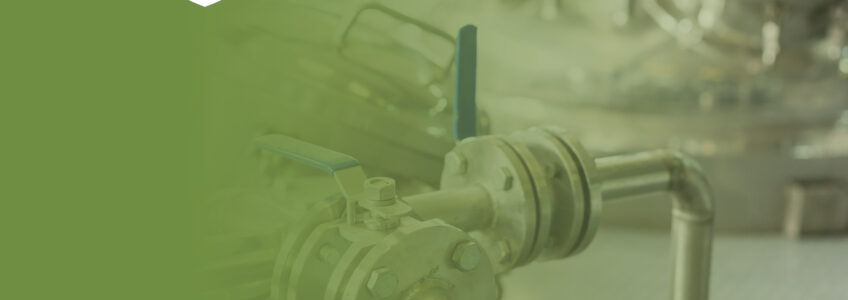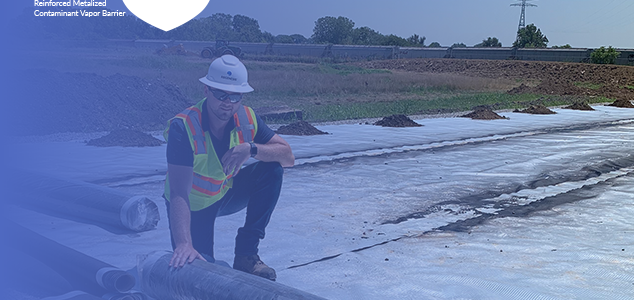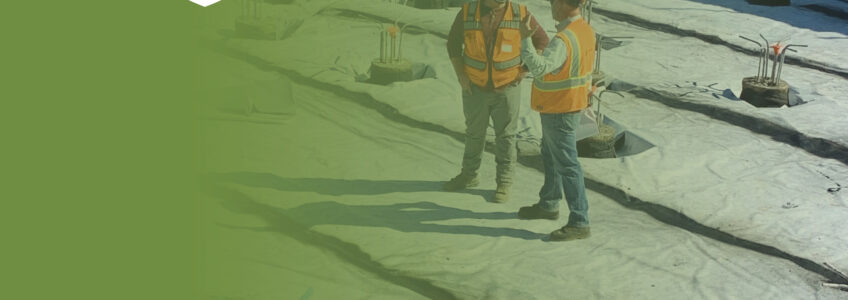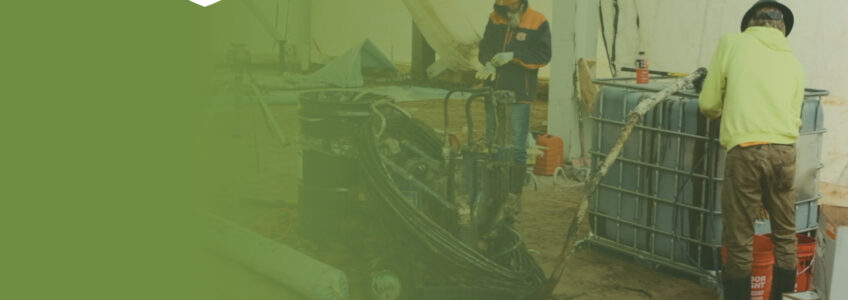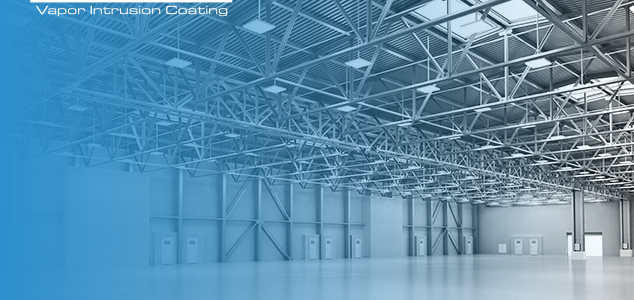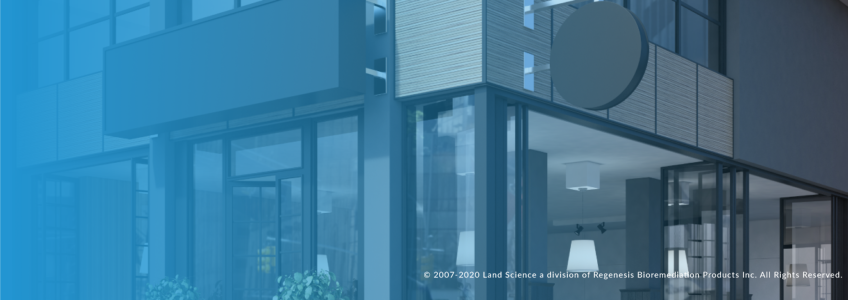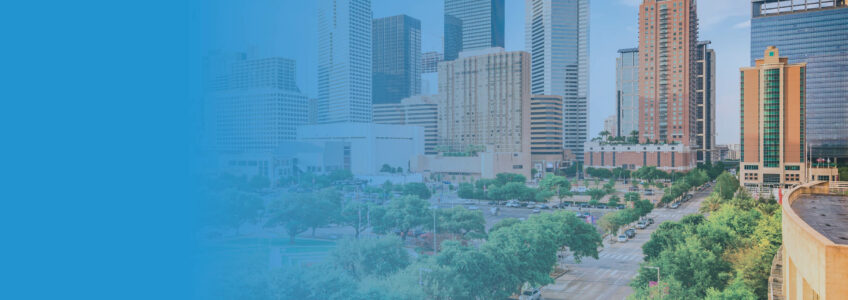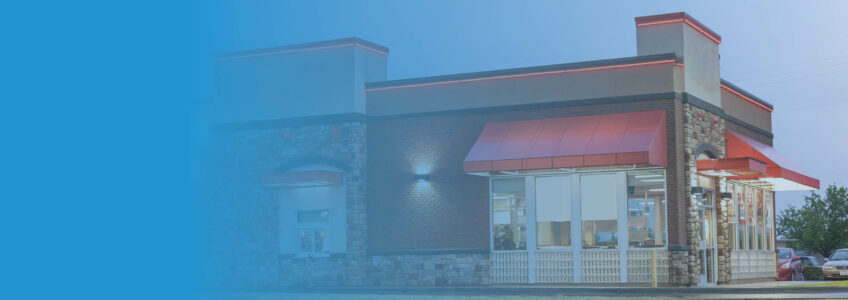Nitra-Seal Installed at Large Chicago E-Commerce Distribution Center
Project snapshot highlights:
- Seamless coordination kept the 4.4-acre installation ahead of schedule for the fast-moving project
- 190,000 Square Feet of Nitra-Seal Installed
- New e-commerce distribution center met the IEPA’s TACO guidelines for mitigating the VI exposure pathway and the tenant’s requirements for a healthy built environment
With little to no green sites to develop in the Chicagoland area, many new building projects occur in former industrial areas that have been environmentally impacted. Such was the case for a new 190,000 squarefoot e-commerce distribution center constructed with a Nitra-Seal® Nitrile-Advanced Contaminant Vapor Barrier and TerraVent™ Low Profile Venting System to address the potential for vapor intrusion (VI). The advanced vapor barrier system met the Illinois Environmental Protection Agency’s (IEPA’s) Tiered Approach to Corrective Action Objectives (i.e., TACO) for remediating the VI exposure pathway.
VOC Risk Mitigated at Site of Former Chemical Manufacturer
Project snapshot highlights:
- TerraShield chosen as most protective, economical vapor intrusion mitigation solution for large logistics facility
- Future occupants protected against volatile organic compounds
- TerraShield successfully installed on time and within budget
A long-vacant San Francisco Bay Area brownfield was once the site of a former chemical plant that produced chlorofluorocarbons, fuel additive anti-knock compounds, and titanium dioxide from 1956 to 1997. With onsite rail service and more than three million households within 50 miles, the property was considered a prime location for a new 2.2 million square foot logistics development. However, the site’s prior industrial history left residual volatile organic compounds (VOCs) in the subsurface and posed a potential vapor intrusion risk. Following a cost-benefit analysis and thorough evaluation of contaminant vapor barrier systems available, TerraShield® Metalized Nitrile Contaminant Vapor Barrier was selected for the new logistics building.
MonoShield Protects Large Texas Warehouse Site Against Vapor Intrusion
Case study highlights:
- Rapid installation keeps fast-moving Brownfield redevelopment project on track
- MonoShield selected as best alternative for chemical resistance, competitive cost, and installation speed
- Project meets aggressive time and budget constraints, ensuring safe breathing environment
The project is led by Reserve Capital Partners, a leading commercial real estate development company. Its construction arm, Reserve Construction, is transforming the former brownfield into valuable warehouse space. As a leader in the field, Reserve Capital Partners has invested millions of dollars in developing and managing high-value properties for clients and investors throughout the Dallas area. The Marquis Development consists of two expansive logistical warehouse buildings covering approximately 200,000 square feet. Due to past industrial activities in the surrounding area, a vapor intrusion mitigation system (VIMS) was required for newly constructed buildings on the property.
Brownfield Site in St. Louis is Transformed Using MonoShield
Case study highlights:
- Green Street Real Estate Ventures (Green Street), a leading commercial real estate development company based in St. Louis, partnered with environmental consultant ATON Environmental to assess and mitigate the environmental concerns.
- MonoShield® was applied at a former St. Louis manufacturing site to effectively mitigate contaminant vapor intrusion.
- The new River City Business Park is poised to bring jobs, innovation, and sustained economic growth to the community.
In 2009, the Green Street-led development team entered the site into Missouri’s Brownfield Development Program, a move that provided economic incentives to offset some of the site’s significant restoration costs, which included remediating impacted soil and groundwater and raising the building grounds above the river flood plain. Upon entering the program, site remediation commenced to address the contamination. Over time, the site remediation requirements were met, earning a Certificate of Completion issued by the MDNR for all groundwater monitoring. With the Certificate in hand, the project team moved forward with the development. The new River City Business Park would include four large buildings covering an area of 585,000 square feet. The modern, environmentally sustainable, and flexible building plan accommodates diverse uses, offering spaces for office work, light industrial manufacturing, tech ingenuity, and warehousing.
TerraShield Assists Development in Sacramento’s Downtown
Project snapshot highlights:
- Innovative Vapor Barrier Chosen for Electrical Substation as Safest, Most Cost-Effective Solution
- Timely and Cost-Efficient Application Allows Development to Proceed
- Innovative, Nitrile-Advanced Core Quickly and Effectively Seals Utility Penetrations and Terminations
Sacramento is experiencing a renaissance, with a metropolitan area that has grown to include over 2.5 million people. As the city continues to grow and change, the downtown Sacramento area is evolving rapidly with many new buildings in various construction stages. Roebbelen Contracting, Inc., a leading Northern California based contracting and construction firm, was engaged by their client to build an electrical substation in the downtown area. The substation development included the need for a contaminant vapor barrier system due to past heavy industrial land usage. Keeping pace with the latest vapor mitigation innovations, the environmental consultant, working with their client, recommended Land Science’s TerraShield® based on it having demonstrated 100 times more chemical resistance than other vapor barrier systems.
TerraShield Installed at New, State-of-the-Art Aquatic Research and Education Center
Project snapshot highlights:
- Volatile Organic Contaminants
- State-of-the-Art Research and Education Center
- 8,500 Square Feet Installed
In Michigan’s Upper Peninsula, Lake Superior State University (LSSU) is constructing a $14.5 million expansion that will house its state-of-the-art Center for Freshwater Research and Education (CFRE). When completed, the CFRE building will include freshwater testing laboratories, classrooms, an aquatic learning center, and an expansion of LSSU’s internationally-renowned fish hatchery. The new building is being constructed in an area of past spills of volatile organic contaminants (VOCs), posing a potential vapor intrusion risk. Assessing the risk and the options to mitigate it, the project team opted to install TerraShield® with a TerraVent® passive venting system. Terrashield was determined to be the vapor mitigation solution providing the highest level of protection at a competitive cost and offering superior installation efficiencies as compared to alternative vapor intrusion mitigation approaches.
A Growing Manufacturing Company Brings New Jobs to Lansing Area following Retro-Coat Treatment
Project snapshot highlights:
- Retro-Coat Allows Repurposed Industrial Building to Create Jobs in Michigan Community
- 140,000 Square Feet Manufacturing Facility Successfully Treated
A growing manufacturer looking to expand its operations purchased a vacant industrial facility in Lansing, Michigan, where chlorinated solvents were used and spilled into the subsurface. The environmental consultant was asked to address the suspected vapor intrusion concerns resulting from the former industrial operations. In working with the Michigan Department of Environment, Great Lakes & Energy (EGLE), the consultant proposed utilizing the Retro-Coat® Vapor Intrusion Coating System, in combination with passive venting, to ensure safe indoor air for the future workers. EGLE approved the vapor mitigation approach to address the potential indoor air concerns. The Retro-Coat installation was sequentially phased in accordance to the construction schedule, where the Certified Applicator worked closely with the general contractor and the consultant to meet project expectations and deadlines. Since the Retro-Coat system will act as the wearing surface at this facility, the Retro-Coat Top WB topcoat was also applied to maintain the desired aesthetic of the building owner. Following the Retro-Coat and passive venting system’s successful application, the potential exposure pathway has been mitigated, and the site is eligible for restricted site closure designation by EGLE.
Ease of Installation Saves Time and Money for Preemptive Solution To Mitigate Potential Gasoline Vapors
Project snapshot highlights:
- Nitra-Seal protects future restaurant workers and guests
- Former Gas Station
Property developers for a national restaurant chain planned a new restaurant building on an old gas station in Galveston, Texas. It is common practice in the retail restaurant industry that when confronted with building a restaurant on a former gas station, the property developers will specify a vapor mitigation system (VMS) into the construction plan. The VMS serves as a preemptive measure to address gasoline contaminants that might have escaped detection during the site closure process. In these instances, the property developers require that the vapor mitigation system installation be completed efficiently and at a competitive cost while providing comparable or better chemical resistance. After evaluating VMS options, the property development team specified Nitra-Seal as the technology best suited for this purpose. According to the Land Science certified applicator, in comparing their experience installing generic styrene-butadiene-rubber asphalt emulsions, Nitra-Seal’s spray-applied nitrile-advanced asphalt latex core material was easier to apply and cured more rapidly. This saved time and money for the VMS installation, improving the project’s overall construction efficiency, and enabling the restaurant to proceed toward its opening.
Nitra-Seal Ensures Worker Safety For New Office Campus
Project snapshot highlights:
- New Office Campus in Pennsylvania
- Site-Specific Design for Unique Foundation Layout
- 16,000 Square Feet Installed
An established, construction services company was developing a new corporate campus on a former industrial manufacturing site where chemical degreasing agents were used. Prior to the building’s planned construction, an investigation was conducted, identifying chlorinated volatile organic compounds (VOCs) in the subsurface. Based on the investigation results, the project stakeholders specified the installation of a vapor mitigation system to address the potential VOC vapor intrusion risk to future building occupants. The consultant and their client were familiar with Land Science’s full suite of vapor barrier systems and had installed their vapor mitigation technologies at other building sites in the past. The team specified Nitra-Seal® for this project based on its top-performing chemical resistance and installation efficiencies compared to other spray-applied barrier systems considered. The building’s unique foundation layout required a nuanced approach and site-specific design support from the Land Science team. The Land Science Certified Applicator installed the Nitra-Seal vapor mitigation system efficiently and according to specifications, allowing the new office campus construction to proceed without delay.
Nitra-Seal Facilitates National Restaurant Chain Expansion into Growing Texas Market
Project snapshot highlights:
- Petroleum Hydrocarbon Vapor Contaminants Effectively Mitigated
- Solution Chosen Based on Best Combination of Chemical Resistance,Installation Efficiency and Price
An expanding quick-service restaurant (QSR) chain planned a new store in the rapidly growing central Texas market at a former gasoline station site. Although there was no active environmental incident associated with past use, it is common for petroleum hydrocarbons (PHCs) to remain in the subsurface, undiscovered at former gas station sites. Using their knowledge and experience in developing similar properties, the QSR client recognized the potential risk of petroleum hydrocarbon (PHC) vapor intrusion. To ensure their future associates’ and guests’ well-being, the QSR client specified installing the Nitra-Seal® vapor mitigation system as a preemptive measure to protect against PHC vapor intrusion. They chose Nitra-Seal because it provided the best combination of chemical resistance, installation efficiency and price compared to other similarly priced vapor barrier systems. The Land Science certified applicator completed the installation according to manufacturer recommendations within aggressive time and budget constraints, allowing the restaurant to proceed toward its scheduled opening in the Fall of 2020.



